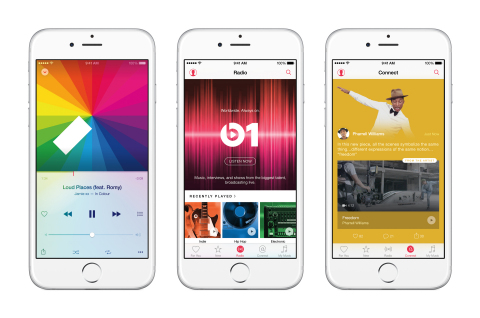
Apple Music is entering a crowded streaming music field dominated by big name players such as Pandora, Spotify and Rdio. The company got a running start with its acquisition of Beats Music in a deal worth $3 billion. So how does the newly launched Apple Music compare to its competitors? Read on to find out.
Apple Music

Apple Music is powered by the underlying technology driving Beats Music. Apple music includes a streaming service, a Music Radio component that features the live radio station Beats 1 and a social component called Connect.
Availability: Available in 100 countries worldwide. Compatible with Apple’s iOS devices, Mac and PC desktops. Android and Sonos support expected to be added later this year.
Cost: $9.99 a month for an individual account, $14.99 for a family account that supports up to 6 users.
Free version: Apple Music is primarily a paid service — there is a free option, but it is limited to Beats 1, a skip-limited version of Music Radio and a stripped down version of Connect. A three-month free trial will be available at launch.
Number of Tracks: 30 million
Number of Users: 11 million trial subscribers
Pros: Powered by Beats stellar recommendation engine and the new Beats 1 live radio station, Apple Music has the potential to attract a new set of customers.
Cons: Apple Music will be competing against Spotify, Pandora and others. Will customers drop their existing service to switch? Only time will tell.
Tidal

Tidal is a new music streaming startup backed by rapper Jay-Z that launched earlier this year with little fanfare.
Availability: 44 countries worldwide.
Cost: $9.99 monthly for basic streaming; $19.99 a month for high-fidelity sound.
Free version: Tidal offers a 30-day free trial after which the service is paid only.
Number of Tracks: 30 million
Number of Users: 900,000
Pros: Tidal is hoping its exclusive content (songs, videos, and concerts) and high-fidelity sound will attract dedicated customers. It also pays higher royalties to musicians than its rivals.
Cons: An awkward launch in which 16 superstar musicians complained about royalties and pledged their dedication to the company has tempered consumer interest in the service.
Rdio

Launched by Kazaa and Skype founder Janus Friis, Rdio combines on-demand streaming with online radio stations.
Availability: 85 countries.
Cost: $9.99 a month for Rdio Unlimited plan. New $3.99 Rdio Select version provides access to stations and allows subscribers to downloads up to 25 tracks
Free version: Yes, Rdio has an ad-supported version that lets users listen to stations, but limits skipping.
Number of Tracks: 32 million.
Number of Users: Unknown, not disclosed.
Pros: Affordable Rdio Select plan appeals to consumers looking for an inexpensive way to stream. The service also is known for its visually pleasing interface that prominently displays the album art.
Cons: The recommendation engine for its radio stations are less than stellar.
Spotify

Hailing from the UK, Spotify is the largest subscription music service by subscriber numbers
Availability: 58 countries worldwide.
Cost: $9.99 a month for premium service. Spotify currently is offering a three-month introductory subscription for 99 cents. There’s also a family plan that lets you add additional accounts with a 50% off discount.
Free version: Yes, Spotify offers a free ad-supported version for desktops and a limited, free mobile version for mobile phones and tablets.
Number of Tracks: 30 million.
Number of Users: 20 million paid, 55 million free.
Pros: Spotify has best-of-the-business social media sharing and excellent sound quality. It also has widespread support, being available on all major platforms and home audio systems.
Cons: Spotify has faced criticism from musicians over its low royalty payments. In a high-profile rejection, Taylor Swift pulled her music from the service last year.
Pandora Radio

Founded in 2000, Pandora Radio is the most successful internet radio service in the world. Pandora’s name is synonymous with internet radio and it is the standard by which other services are compared.
Availability: United States, Australia, and New Zealand.
Cost: $4.99 a month for an ad-free version.
Free version: Yes, but it includes commercials.
Number of Tracks: 1 million.
Number of Users: 76.1 million free users, 3.8 million subscribers.
Pros: Pandora has name recognition and broad device support, two features that make it attractive to users. It’s also easy to use — just enter an artist’s name or song title, and you’re ready to listen to your custom radio station.
Cons: Pandora’s recommendation engine is hampered by the service’s small music catalog with many users complaining about song repetition. There’s also no on-demand streaming option so users are stuck with an algorithm generated stream. Limited skips in free mode also can become annoying.
With so many different services available, users can select the music service that best fits their needs. Which service are you using now? Do you plan to make a switch in the near future? Let us know in the comments.